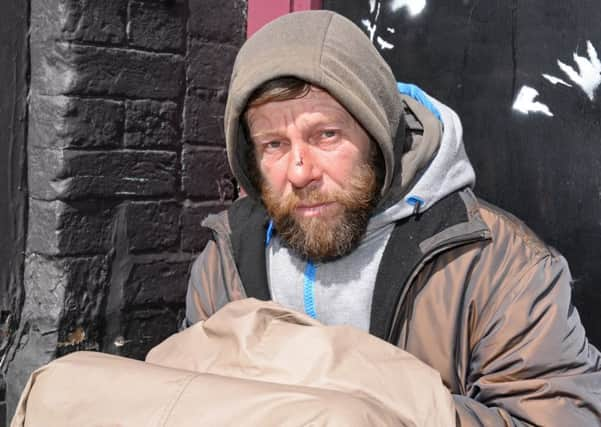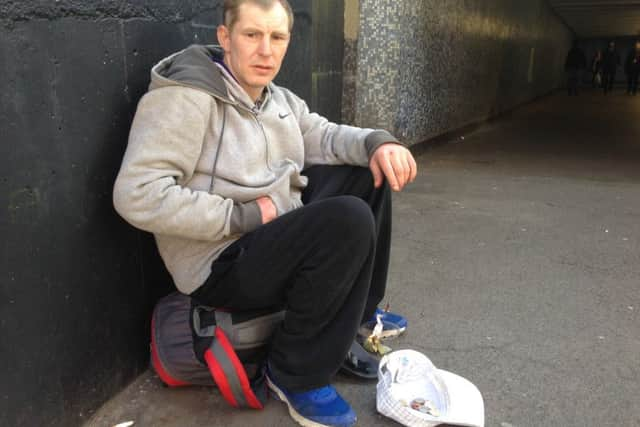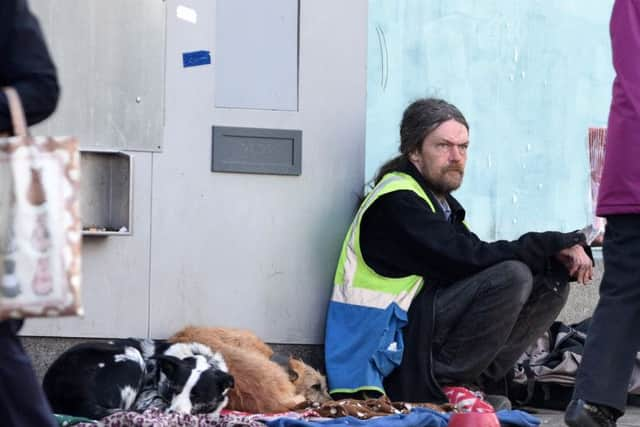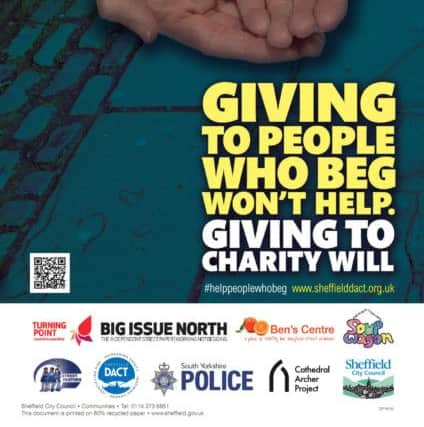Giving to Sheffield beggars '˜will only make things worse', say campaigners


Begging is not a new problem, and laws exist to deter people from doing it. But increasingly organisations like the police, councils and charities are realising that the solution to begging is not as simple as a slap on the wrist and a court fine.
In September a joint campaign was launched by South Yorkshire Police, Sheffield Council and a range of support agencies, calling on people to donate to charity rather than putting money in the hands of street beggars. The idea behind it was that giving directly to beggars simply perpetuates their lifestyle and offers nothing but a quick fix.


Advertisement
Hide AdAdvertisement
Hide AdBut city centre neighbourhood sergeant Naomi Saxton, one of those who led the campaign, believes it could have been worded better. There are now plans to relaunch the campaign with a more considered message.
Sgt Saxton said: “I believe the only way that we are going to be able to tackle this is to educate the people who give to beggars to stop giving.”
“That’s difficult. I’ve done it myself. You want to help.
“But I know for sure that a lot of the people who are begging on the streets of Sheffield have got dependencies. They are not homeless. And some of the ones who are actually homeless are homeless because they haven’t been able to maintain a tenancy.


“It’s a massive social problem. It isn’t really about the begging, but that’s how it manifests. That’s the visible interface of the public who see someone in need and they think giving them a pound is going to help. But it keeps them stuck in that lifestyle.
Advertisement
Hide AdAdvertisement
Hide Ad“Begging is easy. It funds the people who do it and enables them to maintain the lifestyle they are choosing to maintain.”
The initial campaign has led to a greater understanding of why people beg, and organisations involved are keen to keep up that good work.
Asking for money or food on the street is illegal, and has been since the introduction of the Vagrancy Act in 1824. The police have the power to move on beggars, and can summon persistent offenders to court.


But Sgt Saxton said: “I genuinely don’t think punishment is the answer. If we wanted to enforce against every single beggar we would run out of officers very quickly every day. This on its own wouldn’t be considered a priority. But the fact that we have vulnerable adults is a priority, for us to work together to try to support and protect them. That doesn’t fit with sending everyone to court.”
Advertisement
Hide AdAdvertisement
Hide AdShe added: “To try to sanction someone who’s already begging is just going to perpetuate the problems. I think the public appetite for issuing sanctions against people who are vulnerable is not there.”
The solution, says Sgt Saxton, requires long-term thinking and the work of many organisations. It also requires people to make the difficult decision not to give to beggars.
The anti-begging campaign will be relaunched with a new message in the coming weeks. A lot of work has been done with Sheffield’s two universities, as research shows it is often students who are most likely to give to beggars.


Sgt Saxton said: “We tried to engage with the student population around getting them to tell us what would be an acceptable message. We are trying to educate the people who give money to people who beg that it’s not helpful.”
Advertisement
Hide AdAdvertisement
Hide AdThe message is consistent across all the organisations who deal with street begging and its associated problems. One option for people on the street, which is obvious to anyone walking around Sheffield city centre, is to sell the Big Issue.
Assistant director of Big Issue North Emma Eaton said: “Big Issue North offers a positive alternative to begging. Vendors buy the magazine from us for £1.25 and sell it for £2.50, keeping the profit they make.
“We know that selling the magazine gives people a structure to their lives, it gives people confidence, motivation and boosts their self-esteem, which in turn inspires people to make changes to their lives.
“We are one of a number of organisations seeking to address increased levels of begging in a coordinated way.”
Advertisement
Hide AdAdvertisement
Hide AdAnother charity trying to help is the Cathedral Archer Project, which offers a range of support from meals and hot drinks to clothing, workshops and computer use.


“I’m not convinced that anyone needs to resort to begging on the street,” said the charity’s chief executive officer, Tim Renshaw.
“The reasons most people seem to want money on the streets is to fund things like their addictions.
“I think we live in a very caring city and we want people to be concerned about issues like homelessness. But that concern must be to help people make progress.”
Advertisement
Hide AdAdvertisement
Hide AdAnyone who comes to the Cathedral Archer Project, based behind Sheffield Cathedral in Campo Lane, is given an assessment that looks into their history, medical situation, benefits, and various other factors.
If they pass the assessment they can access all the charity’s services. The aim is to help them improve their lives, no matter how long it takes. They may stay with the project or they may be referred to one of the many other agencies that offer appropriate support.
But if people are able to fund their habits or lifestyles by begging, they are less likely to come to the charity. This can make their situation even worse, leading to homelessness and other problems.
Mr Renshaw said: “Where people are successful at getting money on the street, that’s not helping them to move away from issues around homelessness.
Advertisement
Hide AdAdvertisement
Hide Ad“We have had three people this year who are successful and prolific in terms of being out there daily begging who have lost accommodation because of their addictions to drugs or alcohol that is funded through the begging. For them, it’s moving the opposite way.
“Their first need is to feed the addiction. Their addiction grows rather than is being addressed, so they need more money.
“We really want people to be concerned but actually giving money can make things worse.
“The majority of people who are asking for money on the street aren’t asking because of homelessness.”
Advertisement
Hide AdAdvertisement
Hide AdThe overlap between homelessness and begging seems to be small, and primarily involves rough sleepers. Sheffield Council says there are about a dozen rough sleepers in the city.
“The lives of people rough sleeping are very complex so it needs to be work that’s slower and more long term to help them,” said Mr Renshaw. “There is no way that being successful at begging helps that.”
Paul, 42, worked for most of his life until he was hit by a car three years ago. He started having fits and seizures, and was diagnosed with epilepsy. He lost his job, his partner left and he ended up on the streets.
Paul has been sleeping rough for eight months. He doesn’t want to beg but doesn’t see another option.
Advertisement
Hide AdAdvertisement
Hide Ad“Nothing makes you feel good. Even when you get handed food. You want it because you’re hungry but it doesn’t make you feel good. It’s degrading.
“There are some on false pretences who do it for drink and drugs but not everyone is like that.
“A lot of beggars threaten the public so all homeless get tarred with the same brush.”
Life on the streets is tough. Paul said: “It ain’t a bed of roses and people don’t earn anything like what people are saying. I’ve been bullied, I’ve been robbed. My confidence is rock bottom.”
But support is out there.
Advertisement
Hide AdAdvertisement
Hide AdBecky, 34, was in an abusive relationship and eventually ran away from home. She has been living in a women’s refuge for nine months.
“I didn’t want to beg because of the support that’s available,” she said. “I stayed on the street for a couple of nights. It was scary because I didn’t know if my partner was lurking about. I didn’t know there was anything like the refuge.”
Becky will soon move into a permanent home.
Another who has been helped, this time by the Cathedral Archer Project, is Dave, 30. He ended up on the streets when he split up with his partner. “I couldn’t ever bring myself to stop people in the street and ask for a spare 10p,” he said.
“No-one needs to beg. You can come to the project, get breakfast and dinner, get a shower and clothes. At teatime there’s a soup kitchen. No-one is that desperate they need to stop someone and beg for food.”